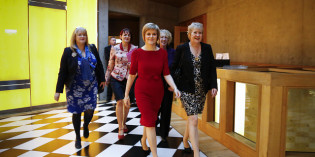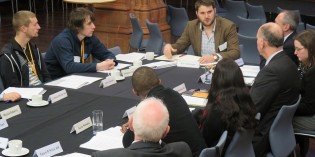Informing and engaging citizens

The recent change to the Ministerial Code is about more than simply economical drafting
Earlier this month, the Ministerial Code was amended so that it no longer makes reference to any obligation to comply with international law. Mark Elliott argues the new wording is an unhelpful oversimplification which raises fundamental questions about the relationship between different types of legal norms. Unless it were envisaged that the UK Parliament would legislate in a way that […]

Engagement at the local level should be citizen-led rather than institution-led
Simon Burall of Involve, a think tank specialising in democracy and public engagement, recently authored a new report entitled ‘Room for a View’, which focusses on the idea of UK democracy as a deliberative process. In responding to the piece, Jessica Studdert of the New Local Government Network looks at the potential for heightened engagement […]

Citizens worldwide are embracing civic technology but the profile of users varies markedly between countries
Technologies aimed at giving citizens the power to hold their governments to account are becoming increasingly common in both developing and affluent countries a new report published by mySociety explores who uses civic technologies and why across four countries, and finds that there are significant differences between users in the US and UK compared to […]

The impact of academia on Parliament: 45 percent of Parliament-focused impact case studies were from social sciences
How does academic research feed into the parliamentary process? Analysing the impact case studies of the 2014 REF, Caroline Kenny draws out potential lessons on how Parliament is currently engaging with academics, and how it might in the future. Impact case studies referring to Parliament were found in all four of the main subject panels, […]

Anonymising UCAS forms is only a first step towards fair and discrimination-free university admissions
The Prime Minister recently pledges to make university admissions ‘name-blind’, responding to statistics which showed a significant racial imbalance in terms of who is admitted to university, with obvious implications for social mobility, fairness, and access to higher education. Steven Jones argues that while this idea is in some ways sensible, it overlooks other more […]

Book Review: The End of Representative Politics by Simon Tormey
In The End of Representative Politics, Simon Tormey challenges the assumption that politics and democracy are ‘dead’, blighted by chronic distrust of the political class and undermined by the perceived failure of representative democracy to secure social justice. As Tormey instead points towards emergent forms of ‘subterranean’ politics indicative of a ‘post-representative’ era, Ali Dadgar […]

Involve’s ‘Room for a View’ represents an important intervention in the debate on democracy’s future direction
Following the publication of ‘Room for a View’ by Simon Burall of Involve, the organisation asked significant voices from academia, research, and political science to respond to its arguments. Here, Graham Smith of the Centre for the Study of Democracy at the University of Westminster briefly reflects on its lessons. Similar PostsWidespread democratic change could […]

The moment of genuine interest in Canada’s democracy afforded by Stephen Harper’s defeat must not go to waste
The Canadian electorate this week ejected Stephen Harper, the long-serving and controversial Conservative Prime Minister of Canada, and replaced him with the Liberal Party’s Justin Trudeau, who has promised to restore democracy to Canada after a decade of its slow-motion destruction. This moment must not be wasted, argues Claudia Chwalisz. Similar PostsThe promise to change the […]

Has the tide turned for women’s representation in Scotland?
Scotland has a female First Minister, who competes in Holyrood with a female Leader of the Scottish Labour Party, as well as a female leader of the Scottish Conservatives. While this should be welcomed, we should not assume that the problem of women’s under representation is solved for good, and instead look at what statutory […]

The representation of women in elected positions in Wales is not mirrored by the number of women giving evidence
Wales has made more progress on gender equality in its elected bodies than Westminster or the other devolved governments. However, Rebecca Rumbul’s research indicates that the number of non-elected women giving evidence to committees in the Welsh National Assembly is much lower, and in one third of the cases all the participants were male. She […]


 Democratic Audit's core funding is provided by the Joseph Rowntree Charitable Trust. Additional funding is provided by the London School of Economics.
Democratic Audit's core funding is provided by the Joseph Rowntree Charitable Trust. Additional funding is provided by the London School of Economics.